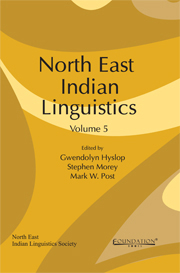Book contents
- Frontmatter
- Contents
- About the Contributors
- Foreword
- A Note from the Editors
- Contact and genetic linguistics
- Historical-comparative Tibeto-Burman grammar
- The North East Indian noun phrase
- 7 The marking of noun phrases: Some observations on the languages of North East India
- 8 Deverbal nominals in Sumi
- Assamese grammar
- Advances in Boro-Garo phonology
- Poetics and text
8 - Deverbal nominals in Sumi
from The North East Indian noun phrase
Published online by Cambridge University Press: 05 September 2013
- Frontmatter
- Contents
- About the Contributors
- Foreword
- A Note from the Editors
- Contact and genetic linguistics
- Historical-comparative Tibeto-Burman grammar
- The North East Indian noun phrase
- 7 The marking of noun phrases: Some observations on the languages of North East India
- 8 Deverbal nominals in Sumi
- Assamese grammar
- Advances in Boro-Garo phonology
- Poetics and text
Summary
Introduction
Sumi (also known as ‘Sema’) is a Tibeto-Burman language spoken in Nagaland, North East India. Previous research on Sumi, including Hutton's (1968 [1921]) seminal work and Sreedhar's (1976) phonetic reader and (1980) grammar, describe three contrastive tones in the language but fail to provide adequate or consistent transcriptions of these tones. Consequently, little work has been done on the tonal phonology in this language, and none at all on the interaction between tone and morphology.
Recent fieldwork has shown that tone changes are frequent in the derivation of nominals from verbs in Sumi. For instance, pi [pì] ‘to speak’ has low tone, while its deverbal counterpart akipi [akipí] ‘speaking; speech’ has mid and high tone. This article will demonstrate how such deverbal nominals are formed and describe any accompanying tone changes. It will also show that the syllable structure of the verb plays an important role in deverbal formation.
Finally, a possible historical origin for such tone changes will be proposed by looking at deverbal formation in other related languages, including Khezha, Tenyidie (Angami) and Mao, which Burling (2003) has grouped together in a proposed ‘Angami-Pochuri’ group. Figure 1 shows the position of Sumi (called ‘Simi’) in this group.
- Type
- Chapter
- Information
- North East Indian Linguistics , pp. 192 - 210Publisher: Foundation BooksPrint publication year: 2013



